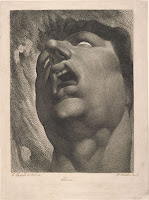Sympathy for the Devil
 I'm getting a little tired of hearing that protagonists must be 'sympathetic', that if the MC is not likeable, then readers won't buy the book, won't read it – they want to be able to project themselves onto the MC – if a writer doesn't do that, then the book will fail.
I'm getting a little tired of hearing that protagonists must be 'sympathetic', that if the MC is not likeable, then readers won't buy the book, won't read it – they want to be able to project themselves onto the MC – if a writer doesn't do that, then the book will fail. So that would rule out Humbert Humbert, Macbeth, Milton's Satan, Dorian Gray, Patrick Bateman – it's easy to go on and on. Do we really want a literary world where these guys don't exist?
Sympathy is one way of engaging a reader with a character, but it is only one way, and the most obvious way. I sometimes wonder if these commentators that insist on sympathy for protagonists actually mean empathy, which is a far more interesting reader response as it allows for a far greater range of characters that people can relate to - they can understand the character, without feeling compassion for them, which is what sympathy, a rather more patronising response, implies.
What is most important for a story is that characters achieve some kind of balance – the way I see it, a long running character that doesn't go through a character arc (this is typically the case with series detectives) need a balance of both admirable qualities and flaws – Poirot's vanity, Morse's moroseness etc. More traditional MCs that are bad, or unlikeable, need to attain some kind of balance, either by getting their comeuppance in the story, or realising their errors and changing. This is far more important than making a character 'sympathetic' – the need to provide a satisfying re-establishment of stasis.
It is lack of depth in a character, not lack of sympathy, that will cause readers to lose interest. The key to producing characters that readers engage with, or empathise with, is to drill down to their core humanity. We don't like to admit it, but we've all thought about killing someone. In the heart of us all, a bad man lies dormant.
It's also worth remember that in the world of a bad person, their actions are the right ones – they just play by different rules - if you lay those rules out, they are ones anyone can understand.


I think you're right to a certain extent. I definitely agree that the protagonist must be empathetic, not necessarily sympathetic. However, in some cases, a character arc is not needed. Case in point: Blood Meridian by Cormac McCarthy. None of the characters are "likable" in any fashion and I don't believe any of them really change at all. The book is a depiction of human baseness. Sure the characters are complex, but they do not grow.
ReplyDeleteThis is sadly a common issue with my MC - my characters are flawed just like the whole of humanity - look at the Pope's past for example.
ReplyDeleteI find flawed characters real and interestingI like the depth that comes with the dark edges of characters, but sadly others don't see this. My MC is often written off before the end of Ch1 - people are often too quick to judge - give her time and she will appeal to the reader in so many ways, as she's a complex woman.
I ranted more in my 1st reply to you but i somehow deleted it - maybe I should do that with my novel and start again. Perhaps I should write thrillers then people may expect the dark characters i write - i will ponder on that one.
Well said! I've thought about this often myself. There are many examples of well drawn characters that aren't necessarily likable or heroic, just we drawn and compelling. It's hard to identify the good guy in Lolita or even the popular Dexter novels. But I've read both with interest.
ReplyDeleteJames, you're right. It's not sympathy the audience needs to feel. It's INTEREST. Are you interested to know more about the character and what they'll do? Get that right and everything else follows.
ReplyDeleteUggh, as a writer of unsympathetic characters, I completely agree.
ReplyDeleteTo add to what Portia was saying, I've always found Dexter and Humbert Humbert very relatable--they both have no control over their desires, and are helpless to them. I think a character can be likable and not be heroic, or a character can do bad, immoral things and feel more relatable than a hero. I don't like heroes. They bore me.